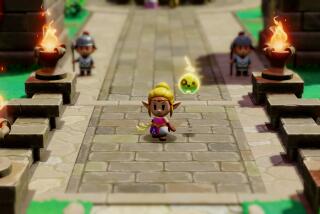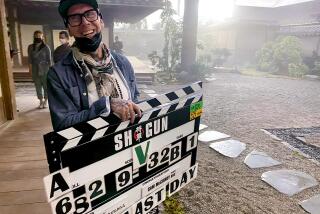The Realities of a ‘Fantasy’ World
- Share via
Before it was the title of a big-screen movie, “Final Fantasy” was one of the most enduring video game franchises in history. Introduced in 1987 by Square Co. in Japan, the role-playing game has sold more than 33 million copies worldwide.
Will the film, which opened Wednesday, join the dustbin of movies that have tried and failed to capitalize on popular video games? Or will it be one of the few game-based movies to be a financial success? And just what does a Japanese game company know about making movies?
Hironobu Sakaguchi, creator of the video games and executive vice president of Square, spoke about his experience directing the movie, which features computer-generated, ultra-realistic human characters.
Q: What are the differences between making a game and making a movie?
A: The biggest difference is the way the story is told and executed. In a game, you have to slow down and let players take control. That gives it interactivity. However, we can’t do that in a movie. The story is nonstop and has to keep going. That’s the biggest difference.
Q: Any similarities?
A: To be honest, there are more similarities than differences. Going into a cubicle and looking over the shoulder of an artist, you won’t be able to tell if he or she is working on a movie or a game. They all work with the same tools, the same software.
Q: Many video games don’t lend themselves to movies because the stories underlining games tend to be very shallow. What makes “Final Fantasy” different?
A: The stories for both the games and the movie were inspired by the death of my mother. So the theme of this story is a bit more sophisticated, a bit more mature. That alone separates it from the other games. We also incorporated some of the mystery-solving aspects of the game into the movie. Just as with the games, we don’t want to make it too difficult or too easy for people. So the plot has a few mysteries tied into it for the audience to solve along the way. It keeps people more engaged.
Q: You mentioned your mother’s death as a source of inspiration. How did this come about?
A: After my mother’s death, I had a difficult time dealing with it. I coped by thinking about aspects of physics that get into the more philosophical realm. I started thinking about life after death in a more metaphysical sense. It’s my hope not only that people enjoy the movie but that people who have lost a loved one can see something they can relate to, something that would give them hope. But I didn’t want it to be preachy. That’s why I set it in a more scientific, action-oriented movie.
Q: When did you first want to make a movie?
A: The idea came four years ago after I finished “Final Fantasy VII.” I knew then that we had the technology that companies such as Pixar [Animation Studios] and [Industrial Light and Magic] had. But in order to push the technology, I had to challenge it with something. The challenge at the time was to make realistic human characters in a feature film with 100-plus minutes of computer-generated animation. So it started as more of a technical goal.
Q: What next?
A: I’d like to continue making more movies and more games. But at the same time, because we are dealing with computer graphics, we are able to experiment with other forms of interactive entertainment. Games as interactive movies, for example. I have three or four story ideas. One involves the characters from the movie, like Aki and Dr. Sid. The idea is to treat them as actors and actresses. Aki, for example, may be cast in a thriller or detective movie.
Q: Will you be using any of the technology created for the movie in future video games?
A: There was certainly some exporting of technology to our games business, particularly in the areas of cloth and hair animation. The biggest advantage of having a separate movie studio may have been the internal rivalry that the game developers had with the movie. They wanted to make a game that would kick the movie’s butt. Causing internal turmoil is always good.
Q: Movies made from video games such as “Wing Commander” and “Super Mario Bros.” generally have not been very successful. Why not? And how is the “Final Fantasy” movie different?
A: The biggest reason things fail is that the originators of games took the concept and the character and just handed them over to Hollywood directors who may not necessarily know very much about the game. What ends up happening is that you have characters that dress similarly, and that’s about it. The big difference with “Final Fantasy” is that it was created by the exact same people who created the game. We know what made the game so successful, and we brought that directly into the movie.
Q: Why was the movie done in English as opposed to Japanese?
A: It’s the economics. We wanted to build a top-notch movie studio to pump out a fully computer-generated movie. That takes a lot of money. So our economic base had to be the U.S. The Japanese movie industry is dismal. It’s expensive to go to movies in Japan. Tickets cost $20 to $25. In Japan, we watch weekly soap operas on television, but not so much full-fledged feature films. Japanese prefer to watch dramas on TV, but Americans flock to theaters.
Q: Does the movie draw from any Japanese anime traditions?
A: If it did, it wasn’t conscious. Obviously, I grew up with Japanese animation, so there are some similarities. There is, for example, a lot of ambiguity in the movie, the fact that you don’t exactly know who the villains are. Things are not black and white. That type of storytelling is very typical of Japanese anime.
Q: The first “Final Fantasy” game came out on the Nintendo platform. In 1996, the games migrated to the Sony PlayStation console. Do you plan to make games for the Nintendo Gamecube or Microsoft’s Xbox?
A: That certainly is a possibility. In fact, executives at Square are very enthusiastic about Nintendo. Square is moving into online games. “Final Fantasy XI,” which will be released next year, will be a fully online game. To make that work, you have to transcend hardware. If we want to do financially well online, we need to exist across all consoles.
*
Translation services provided by Hiroshi Tanaka. Times staff writer Alex Pham covers the video game industry.






